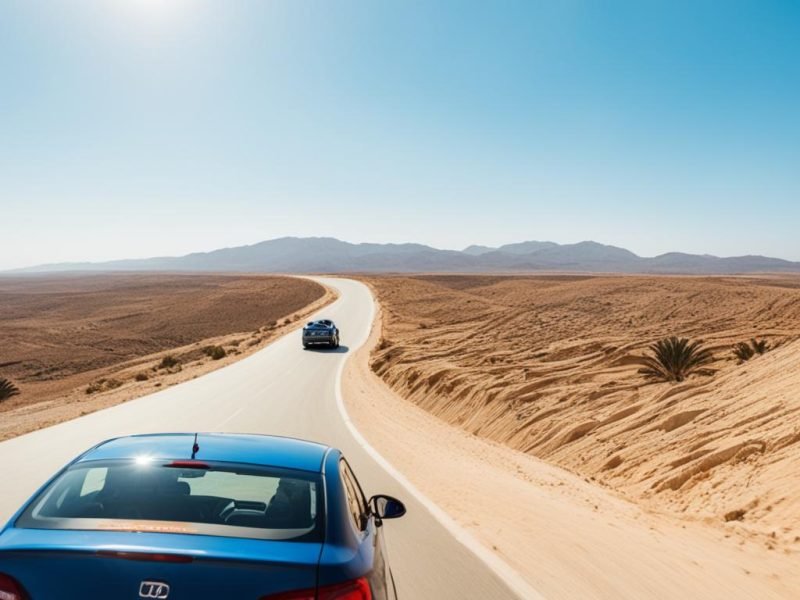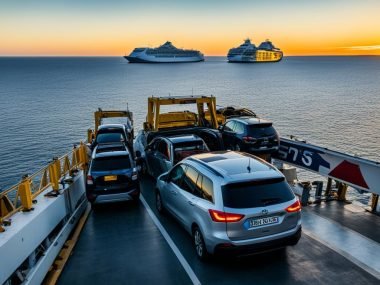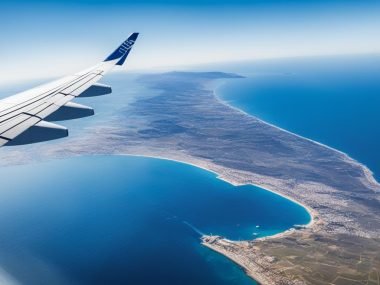Every year, thousands of British tourists venture to the breathtaking landscapes of Tunisia, but an astonishing fact remains – a majority of UK drivers are unaware that driving in Tunisia with just a UK license is not legally enough. You might hold a valid UK license for driving in Tunisia, yet local regulations call for additional documentation. For those planning behind-the-wheel adventures in this vibrant North African nation, understanding the acceptance of your UK driver’s license in Tunisia is essential.
Key Takeaways
- Driving in Tunisia requires more than just a UK driver’s license.
- UK tourists should familiarize themselves with Tunisia’s driving regulations before traveling.
- A UK driver’s license must be accompanied by an International Driving Permit in Tunisia.
- Understanding the local laws ensures your driving experience in Tunisia remains within legal bounds.
- Preparation is key to enjoying the scenic drives and exploring the vast terrains of Tunisia hassle-free.
Understanding International Driving Permit Requirements in Tunisia
If you’re planning to visit Tunisia and want to drive, understanding the International Driving Permit (IDP) for driving in Tunisia is essential. The IDP serves as a complementary document to your native driving license, translating it into multiple languages and ensuring that you meet Tunisia driving regulations for a UK license. It’s a bridge between different legal systems, ensuring that you’re recognized as a qualified driver in Tunisia.
What is an International Driving Permit (IDP)?
An IDP is an official travel document recognized by the United Nations, acting as a translation of your UK driver’s license into several languages, including Arabic and French, which are widely spoken in Tunisia. This document ensures that local authorities and rental agencies can verify your credentials without language barriers. Remember, an IDP for driving in Tunisia is not a standalone document and must be accompanied by your valid UK license at all times.
The Role of the Touring Club de Tunisie for IDPs
The Touring Club de Tunisie is the designated authority that issues IDPs in Tunisia. As a visitor, you’ll need to secure your International Driving Permit in Tunisia before your trip. Although Touring Club de Tunisie issues IDPs within the country, it’s recommended that you obtain your IDP in the UK for convenience and to ensure compliance with Tunisia driving regulations for UK license holders.
UN Conventions and Legal Requirements for Driving in Tunisia
Tunisia is a signatory to two important UN conventions—the 1949 Geneva Convention on Road Traffic and the 1968 Vienna Convention on Road Traffic. These conventions mandate that foreign drivers, including those from the UK, must hold a valid IDP while driving within the country. To align with these international agreements, you must have an IDP that correlates with the versions specified by the conventions. Failing to have the right type of IDP could result in complications while driving in Tunisia, including fines or legal issues.
Understanding these requirements will help ensure a smooth driving experience in Tunisia. So, whether you’re setting off on a scenic drive along the Mediterranean coast or navigating the bustling streets of Tunis, make sure your paperwork is in order to fully enjoy your Tunisian adventure.
Preparing Your Documentation Before Driving in Tunisia
Embarking on a road trip in Tunisia can be an enchanting experience, but prior to setting off, you need to prepare your documentation thoroughly. Familiarizing yourself with the driving permit requirements in Tunisia is essential to ensure a hassle-free journey. Whether you’re planning a short-term visit or a longer stay, understanding the legalities surrounding driving with a UK license in Tunisia is crucial.
Validity of the UK License in Tunisia
Your UK driver’s license is valid in Tunisia, but only when accompanied by an International Driving Permit (IDP). The IDP serves as a translation of your license and is widely accepted across Tunisia. However, it’s imperative to remember that this document doesn’t replace your UK license — you must carry both when driving. Should you be involved in an incident or need to navigate local bureaucracy, having these documents within reach is vital for proving your eligibility to drive.
Accompanying the IDP with Your National License
Upon your arrival in Tunisia, presenting both your IDP and your UK driver’s license will be a commonplace requirement during vehicle rentals and traffic stops. For foreigners driving in Tunisia with a UK license, this dual-document approach not only simplifies interactions with authorities but also safeguards against any legal inconveniences. Regularly check the validity of both documents to ensure they remain current for the duration of your travels in Tunisia.
Below is a quick overview to help you understand the necessary documents you need to drive legally in Tunisia:
| Document Type | Requirement | Validity |
|---|---|---|
| UK Driver’s License | Must accompany the IDP | Must be current and valid |
| International Driving Permit (IDP) | Must be obtained prior to arrival in Tunisia | Varies; check with issuing body |
Ensuring that your paperwork is in order before your journey begins will pave the way for a smooth and enjoyable experience as you explore the breathtaking landscapes and rich history of Tunisia from behind the wheel. Safe travels!
The Importance of an International Driving Permit in Tunisia
When planning a trip that involves driving in Tunisia with a UK driving license, understanding the International Driving Permit requirements is critical. An International Driving Permit, commonly referred to as an IDP, serves as an essential legal document that translates your UK driving license into several languages, invaluable when you’re on the roads of Tunisia. This pass speaks the universal language of travel and driving privileges, ensuring your ability to navigate the streets and highways of this North African country.
Should you find yourself in a situation where you need to interact with local law enforcement or car rental agencies, your IDP will confirm your eligibility to drive. In fact, the IDP translates your license into 10 different languages and is recognized internationally, sidelining potential communication hurdles that might otherwise hamper your travel experience. Furthermore, the International Driving Permit requirements are not merely about legality; they are about ensuring smooth interactions and respect for international driving protocols, which Tunisia abides by.
The possession of an IDP signifies your commitment to adhere to Tunisia’s regulatory framework, while also displaying respect for local road use customs and practices. It is a gesture of goodwill as much as it is a form of identification.
Embarking on your journey with a UK driving license in Tunisia without an IDP is to invite unnecessary complications. Thus, the proactiveness of securing this permit cannot be overstated. Below, find the specifics that illustrate just how vital an IDP is when driving in Tunisia.
| Requirement | Description | Benefit to UK Drivers |
|---|---|---|
| Language Translation | Your UK license details translated into 10 different languages. | Facilitates communication with authorities and rental agencies. |
| Legality | An IDP complements your UK license, ensuring you adhere to international driving laws. | Prevents legal issues and potential fines while abroad. |
| Global Recognition | A universally recognized form of driving qualification. | Enhances confidence and peace of mind when driving in a foreign country. |
| Identification | Serves as an internationally accepted form of ID. | Useful in cases of emergencies or when official documentation is required. |
In summary, your UK driving license is just a part of the puzzle—the IDP completes it, making your time spent behind the wheel in Tunisia as uncomplicated as possible. Remember, the roads of a foreign land may seem daunting, but with the proper documentation, they become a pathway to adventure and discovery. So, don’t underestimate the power and importance of securing an International Driving Permit before your travels; it is indeed your key to the open road in Tunisia.
Age Restrictions and Driver Eligibility in Tunisia
When planning to drive or rent a car in Tunisia, knowing the driving age restrictions in Tunisia is essential. Adequate preparation ensures that you meet car rental eligibility in Tunisia and can make your travel experience smoother and hassle-free.
Minimum Age and Experience Requirements
For you to drive a rental car in Tunisia, it’s mandated that you are at least 21 years of age. Furthermore, you would need to have held your driver’s license for no less than one year, attesting to your experience on the road. This criterion is set to guarantee that all drivers can navigate Tunisia’s unique road conditions with a sufficient level of confidence and safety.
Young Driver Regulations and Fees
If you are under the age of 25, you should anticipate additional charges when renting a vehicle. These young driver fees are common practice in the car rental industry globally, including Tunisia, as they reflect the increased insurance risk associated with less experienced drivers.
| Age Group | Minimum Licensing Period | Possibility of Additional Fees |
|---|---|---|
| 21-24 | At least 1 year | Yes |
| 25 and above | At least 1 year | No |
By familiarizing yourself with the driving age restrictions in Tunisia and the car rental eligibility in Tunisia, you can better prepare for your driving experience in this beautiful North African country.
Navigating Tunisia: Road Rules and Driving Etiquette
Embarking on a journey across the enchanting landscapes of Tunisia can be a thrilling adventure. As a foreign license holder, comprehending Tunisia road rules for foreign license and the driving laws in Tunisia for foreign license is vital for a safe and enjoyable trip. The following insights will guide you through the essential regulations and expected driving etiquette in Tunisia.
Traffic Direction and Seat Belt Laws
In Tunisia, you will be driving on the right-hand side of the road, which may be a change for visitors from countries that drive on the left. Adherence to seat belt laws is non-negotiable; it’s mandatory for both drivers and all passengers. This rule is a critical safety measure and is strictly enforced to protect everyone on Tunisia’s roads.
Mobile Phone Usage and Hands-free Regulations
Keeping your eyes on the road and hands on the wheel is paramount. The driving laws in Tunisia for foreign license holders are clear: mobile phone usage while driving is prohibited unless a hands-free system is utilized. Distractions can be dangerous, so ensuring your full attention to driving details will keep you within the bounds of local legislation.
Remember, carrying your valid driver’s license, vehicle registration documents, and proof of insurance is also mandatory at all times. Not only is this the law, but it’s also your ticket to a hassle-free exploration of Tunisia’s diverse terrains.
Your adherence to the road rules and respect for driving etiquette is a sign of your consideration toward other road users. By observing these guidelines, your driving experience in Tunisia can be as smooth as the Mediterranean breeze sweeping across the Cap Bon peninsula.
Rental Car Guidelines: Can I Drive In Tunisia With a UK License?
For British travellers eager to explore the diverse landscapes of Tunisia by car, understanding the car rental guidelines in Tunisia is crucial. While your UK driver’s license is the key to unlocking the freedom of Tunisian roads, it’s imperative to couple it with the appropriate documentation to ensure a smooth and legal journey throughout your stay.
Car Rental Documentation
When you approach a car rental company in Tunisia, be ready to present not only your full UK driving license but also an International Driving Permit (IDP) if available. This solidifies your ability to drive in this North African country and accelerates the rental process. Documentation proving your identity and travel plans, such as a passport and return flight tickets, may also be requested to finalize the rental agreement.
One-Way Car Hire Policies and Restrictions
Opting for one-way car hire in Tunisia offers flexibility for those planning an extensive tour of the country. Domestic one-way rentals are often available but come with specific terms, such as a minimum rental duration. Conversely, international one-way hires are usually off the table, aiming to keep the rental fleet within national boundaries.
With these guidelines in mind, you’re ready to embark on an exhilarating journey through Tunisia’s historic sites, coastal havens, and desert landscapes. Just remember to ensure that all your documentation is in order before signing off on your rental car agreement. Enjoy the freedom of the open road, and let Tunisia’s beauty unfold before you.
| Car Rental Company | Minimum Rental Duration | Additional Fees for One-Way Hire |
|---|---|---|
| Tunis Car Rentals | 3 days | $30 |
| Carthage Lease | 2 days | $25 |
| Sahara Journeys | 4 days | $45 |
Fueling Your Journey: Understanding Petrol Stations and Tolls in Tunisia
Ensuring your vehicle is always topped up and ready to go is crucial when exploring Tunisia. You’ll be relieved to find that Tunisia petrol stations are widely accessible, offering service around the clock to support your travel plans. Whether you’re venturing through the bustling cities or the scenic countryside, an open petrol station isn’t far out of reach.
24/7 Petrol Station Availability
As you journey across the varied landscapes of Tunisia, the convenience of readily available petrol stations adds a layer of ease to your travels. With a network of stations that operate 24/7, you’re able to fuel up whenever needed, day or night, ensuring that your trip remains uninterrupted and worry-free.
Toll Roads: A-1, A-2 and A-3 Highways
When navigating the country’s infrastructure, you’ll come across the efficient Tunisia toll roads. The A-1, A-2, and A-3 highways are key routes that connect major regions and are maintained to a high standard, offering a smooth driving experience for a nominal fee. These toll roads not only expedite your travel but also guarantee a level of comfort and reliability appreciated by visitors and locals alike.
Parking Advice for UK Drivers in Tunisia
As a UK driver in Tunisia, keeping your vehicle safe is as essential as navigating the roads. Applying practical parking tips in Tunisia and enhancing vehicle safety in Tunisia can make your journey worry-free and more enjoyable. Mastering where, when, and how to park can ensure your peace of mind while exploring the captivating landscapes and cities.
Security Measures for Parked Cars
To minimize risks and protect your vehicle, always remove valuables from sight and lock your doors. Consider parking in well-lit areas or secured car parks wherever available. Surveillance and on-site security play a vital role in dissuading potential theft or vandalism, ensuring your vehicle remains just as you left it.
Parking Areas and Recommendations
Knowledge of the best parking spaces comes in handy, especially for those unfamiliar with the area. Many hotels offer secure parking for guests, and it’s often wise to take advantage of these facilities. Public parking areas are abundant, but it’s important to heed local advice for the safest options.
| City | Recommended Parking Area | Notes |
|---|---|---|
| Tunis | Hotel Car Parks | Several international chain hotels offer guest parking |
| Sfax | Secured Public Parking | Central locations with modest fees |
| Hammamet | Private Beachside Parking | Often provided by resorts with direct beach access |
| Sousse | Underground Parking Facilities | Marked spots and managed entrances |
Remember, your vehicle’s safety in Tunisia relies on proactive measures and thought-out choices. Use these parking tips in Tunisia as a guideline and enjoy your travels without the worry of parking predicaments.
Driving Distances Between Key Locations in Tunisia
While planning your road trip adventures in Tunisia, understanding Tunisia driving distances is crucial to ensure time-efficient travel. Driving in Tunisia reveals a landscape filled with historical sites, bustling markets, and stunning coastlines. To help you gauge travel times and distances, below you’ll find a handy reference chart. Whether you’re exploring the ruins of Carthage or heading to the shores of Sousse, you will find this information pivotal for your journey.
Beyond the iconic routes from Tunis to Sfax and Hammamet to Sousse, there are myriad other destinations worth plotting on your travel map. Each duration and distance calculation can vary depending on road conditions and speed, but the provided information offers a reliable estimate. Pack a sense of adventure along with this guide to embrace the rich experience of driving in Tunisia.
| Starting Point | Destination | Distance (km) | Approximate Driving Time |
|---|---|---|---|
| Tunis | Sfax | 267 | 3 hours |
| Hammamet | Sousse | 77 | 1 hour |
| Sousse | Monastir | 20 | 30 minutes |
| Tunis | Carthage | 16 | 25 minutes |
| Tabarka | Ain Draham | 24 | 35 minutes |
To optimize your travel experience in Tunisia, always consider current local driving conditions and consult real-time navigation tools. By staying informed, you’ll ensure each part of your journey through Tunisia, from cityscapes to Sahara edge, is as smooth as can be.
How to Apply for an IDP: A Step-by-Step Guide for UK Citizens
If you’re a UK citizen planning to drive abroad, it’s essential to understand the process to apply for an IDP from the UK. This guide provides you with a detailed overview of the International Driving Permit application process so you can hit the road with confidence.
Where to Apply for Your IDP in the UK
Acquiring an International Driving Permit is a straightforward process for UK residents. You can apply for an IDP at various Post Office branches across the country. It’s advisable to check the specific Post Office branch for availability of the IDP service before your visit. The application requires a small fee, and you’ll need to present a full valid UK driving licence and a passport-sized photo. In some cases, additional identification may be required, so it’s prudent to bring your passport along just in case.
Checking IDP Validity for Your Destination
Before you apply for IDP from UK, it’s crucial to verify that the IDP is recognised in the country you plan to visit. For driving in Tunisia or any other destination, consult the local embassy or an authoritative body to ensure your IDP will be valid upon arrival. This step is key not only for legal compliance but also for ensuring peace of mind whilst travelling.
Here’s a quick checklist to assist you in the International Driving Permit application process:
Remember, the IDP is supplementary to your UK driving license and does not replace it. Make sure you carry both documents when driving abroad.
To provide you with a clearer picture of the application steps, below is a detailed table with the necessary actions and considerations when you’re ready to apply for your International Driving Permit:
| Step | Action | Details |
|---|---|---|
| 1 | Prepare Your Documents | Gather your full UK driving license and a passport-sized photograph. |
| 2 | Visit Post Office | Go to a designated Post Office that offers the IDP service. |
| 3 | Complete Application | Fill out the IDP form and submit it along with the other requirements. |
| 4 | Payment | Pay the application fee (prices may vary). |
| 5 | Check Validity | Ensure the IDP is recognized in your destination country by contacting the relevant embassy. |
After completing these steps, you’ll be well on your way to obtaining an International Driving Permit, allowing you to drive internationally with greater ease and legality. Safe travels!
Conclusion
If you’re wondering, “Can I Drive In Tunisia With a UK License?“, the answer is a cautious yes, but the keyword here is ‘caution’. Venturing in Tunisia with only a UK license is not enough—you need to secure a companion to your documentation in the form of an International Driving Permit. This is in line with the driving permit requirements in Tunisia, ensuring that your stay and travel within the country is hassle-free and in accordance with local laws.
Your journey in Tunisia, with its grand landscapes and rich cultural heritage, should be remembered for the right reasons. Therefore, obtaining the necessary permits becomes not just a legal formality, but a ticket to an untroubled road trip. An IDP acts as your guarantee that your UK driver’s license is recognized, providing you with the peace of mind to fully enjoy the experience of the open Tunisian roads.
The preparation might seem daunting at first, yet by following the guidelines detailed throughout this article, you’re setting yourself up for a smooth ride. Remember to carry both your IDP and UK license at all times as part of fulfilling the driving permit requirements in Tunisia. Safe travels and soak in every moment of your exploration in the heart of North Africa!







